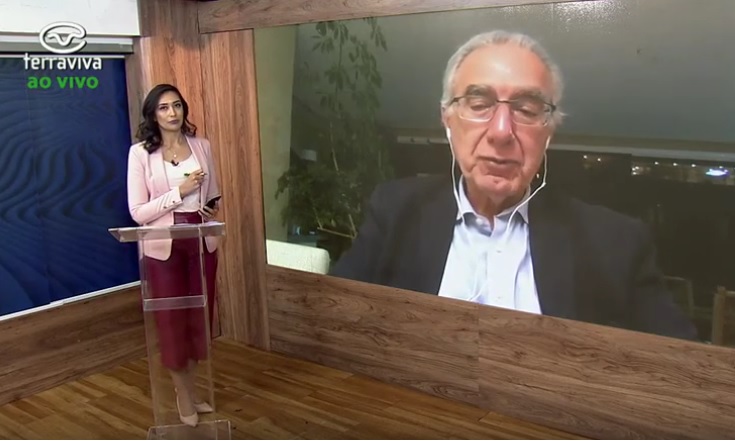São Paulo – The coronavirus pandemic is giving Brazil great opportunities for business with Arabs, Arab Brazilian Chamber of Commerce president Rubens Hannun said during the Agro 360 show that aired on Terra Viva of the Bandeirantes conglomerate last Monday night (11).
Hannun said that the Arabs were investing heavily in its domestic food supply. “The pandemic made them freeze these investments and switch back to buying foodstuffs, especially from Brazil, so we once more have the chance to sell value-added foods and complementary products for their production,” he said.
But the moment of global lockdown has also brought some obstacles, Hannun said. “Since 2015 we’ve studied the possibility of direct sea routes to the Arab countries. Now this is even more urgent. The Arab Chamber is giving priority to create these sea routes, as the Arabs need to make sure that the food shipments get there,” he said.
Another challenge is achieving a greater agility in the exports process. “We are implementing digital certification in more Arab countries. This came to stay, since it cuts turnaround time to 15 days, lowers the cost and fulfills an important social role, as the product becomes more affordable to the Arab consumer,” Hannun said. A third challenge, he says, is a larger demand for products. “We’ve worked to find new suppliers to the UAE, Bahrain and Egypt, which have saw a demand for more products,” he said.
Hannun added that Brazil is making sure that the food trade with the Arabs won’t stop. “This is all our social responsibility, especially with our loyal purchasers. They’ve always seen us like that, so they expect this reciprocity and Brazil’s position is great. That’s what builds up a relation,” he said.
Professor of Global Agribusiness at Insper, Marcos Jank, said that the most vulnerable regions in food security now are the Arab countries and Sub-Saharan Africa, as they rely heavily on food imports. “Brazil’s position saying that it will help taking foodstuffs to these country during this hard times is very important, it’s a brave position, helping to support food security. We are a key country to supply agriproducts to the Arab countries,” he said.
A study on food security led by the Arab Chamber is examining the complementarity of the demands. “This is a strategic project for us and the Arabs, as it addresses a critical issue that is food safety. We have the natural resources and the expertise that world knows about, and they have the financial resources. We must attract these resources to production and logistics. The internationalization of the companies is important, too, as having more Brazilian companies breaking into the Arab countries paves the way. It can’t be just a relation of buying and selling, it has to be two-way process,” Hannun said.
The relation with Arabs, Hannun says, can also bring more benefits to the agroindustry such as jobs. “We have over four million direct jobs created by agribusiness, and we’ll be able to create much more with Arab investment,” he said.
He also announced that the Arab Chamber will open two more international offices, which are slanted to start operating by the end of the year – one in Cairo, Egypt, and one in Riyadh, Saudi Arabia.
The products that could grow or be included in the exports to Arabs include hay, chickpeas, fruits and vegetables. “We could export technology, research and innovation, and they could invest in our structure. They need to feed their population for the next decades, and we could develop the necessary infrastructure to change Brazil, with lower production costs and higher competitiveness,” congressman Alceu Moreira (MDB-RS), president of the Agriculture and Livestock Parliamentary Front, said on the show.
Brazilian Agricultural Research Corporation (EMBRAPA) president Celso Moretti said that Brazil is celebrating a record-high harvest this year, with over 250 million tonnes. “We keep in touch with our Arab partners – we’ve sent the UAE some project proposals regarding genetics adapted to the climate,” he said.
In a recorded video statement, the minister of Agriculture, Livestock and Supply, Tereza Cristina, said that the ministry has discussed cooperation in development technology with EMBRAPA and the UAE and has gotten many agribusiness products to break into countries.
The Agro 360 show “The Diversification of Brazilian Exports to the Arab World” on Terra Viva channel last Monday (11) night featured live participations via video conference of animal protein giant BRF CEO Lorival Luz and Brazilian Animal Protein Association (ABPA) executive director Ricardo Santin.
The show also featured recorded statements of Tamer Mansour, secretary-general at the Arab Chamber; Jacyr Costa Filho, chairman at the Superior Council of Agribusiness of the Industry Federation of São Paulo State (Fiesp/Cosag); Silvia Helena Galvão de Miranda, professor at Luiz de Queiroz College of Agriculture of the University of São Paulo (ESALQ-USP) and deputy coordinator at the Center for Advanced Studies on Applied Economics (CEPEA); and Khaled Hanafy, secretary-general at the Union of Arab Chambers.
Click here to watch the full show.
Translated by Guilherme Miranda




